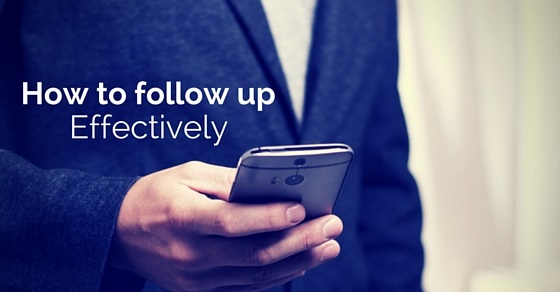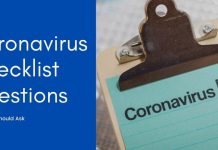It is natural to feel that you do not want to be pestering around hiring managers after a job interview, especially when you eagerly want that job. To acquire that dream job it is important that you do follow-up professionally. You need to be tactful, from the first email itself that you send for following up. You need to make sure you stay on the side of appearing interested in the job and not acting as a pest. You never want to cross the line to being someone who bugs but is memorable and concerned about his or her impression on recruiters. Below are some smart rules on how to effectively follow-up.
 How to Follow Up?
How to Follow Up?
1. Importance of following up:
Follow-up doesn’t only show your interest level and the required qualities that the recruiters are seeking, but will strategically help you to reassure the recruiter about any doubts they might be holding about you being the top choice. It really helps in landing you to a job. Even if you get rejected, you stand out and can lead you to prospective job offers.
2. You must follow-up:
It is essential for one to follow-up as it displays continued interest to them in a particular job opening. You need to keep in mind that you are following up not to become a bother but to be in the minds of hiring managers when they are coming to a decision.
3. Know their timeline:
You must ask and know the company’s timeline for their decision making procedure. The company must be considering other applicants and thus it will take time for deliberation. You cannot expect the organization to get back to you in two or three days of time after your interview. Thus for your satisfaction and knowledge ask the recruiter about the amount of time they will require for coming to a decision.
4. Know the next steps:
You must ask when you will get to know about the decision, who will be the person from the organization that will contact you and via what mode- letter, email or phone call. By this you get an estimate as to how long you are expected to wait for their decision, when will be the right time to follow-up and who to contact when following up.
5. Send thank you mail immediately:
As soon as the job interview gets wrapped up, you must send a thank you email. It can be as you are leaving the company building through your smartphone, the moment you reach back home or by the evening of the interview. You come out as someone who is passionate and organized. This will even ensure that you do not get overlooked as a candidate.
6. Attach a relevant recent news:
A way to stand out in follow ups is to mention latest news about the company which will show the recruiters that the job opportunity is a priority in your mind. It could be something related to their blog post or some industry news. It is very obvious that the news must confer positivity and not some company scandal.
7. Communicate in a professional manner:
If the recruiter states that you must not follow-up, you should not. If there is green signal for you to follow-up, choose the last form of communication with the recruiter that you had, to follow-up. It could have been via phone call or email; select that medium or follow the directions given. It is safe to contact recruiters via email and ensure that the account is his or her business account and not a personal one.
8. Make notes on interview:
Immediately after the job interview, make notes on what you talked about with the recruiter, about a particular trait you have, something that the job title role requires or something about qualification. These specific points or topics raised during the conversation will remind the recruiter about you. You can add these points in your follow-up messages to remind your recruiter about you and to display how attentive you were at the time of interview.
9. Ask if you can contact via LinkedIn:
It is very appropriate to ask your recruiter to connect on LinkedIn. But you must pay attention on how to execute the question; your motive must not appear being overly selfish or assertive about the job offer. Send a message on LinkedIn stating who you are and refer to the significant points of the interview conversation then ask if you can connect.
10. Develop your value in follow-up contact:
Each follow-up contact is a chance for you to construct your value. It could be through providing instant promised information or prompting the recruiter how you efficiently dealt with a situation. Make sure you take advantage of every opportunity where you can build your value after the job interview.
11. No response; attractively follow-up
When the recruiter has stated that you will be contacted after a week and has not turned up with a reply, then it is very much fine to send another polite follow-up to inquire. It is reasonable when you wait for the timeline to end and then inquire.
12. Keep the message concise:
When you follow-up to inquire, it must be concise and pleasant. Do not prominently remind the recruiters that they have not responded back to you but incorporate that the exceeding time, from the given timeline is the reason for your follow-up. A sentence or two will be enough for you to state that the timeline has surpassed and you wanted to know where the recruiters stand, in their decision making process.
13. Be polite and humble:
When you are emailing or contacting to follow-up make sure you do not get emotional and demonstrate irritation or grieve to have not gotten any reply. Display politeness by calmly stating that you are contacting to check how the decision process is proceeding and show humbleness by saying that you understand how busy the recruiter must be to make any contacts back to you.
14. Make alterations:
To be effective while following up, you can send different and fresh mails for each follow-up. Sometimes it is about the right time to follow-up. When you are not responded to your follow-up mail sent in the morning, perhaps you can try mailing in the afternoon or evening the next time.
15. Avoid assuming with references:
When you requested for references, it doesn’t imply that you have got the job. Perhaps when you are asked to supply references, you are in the top choices of the company but there is no guarantee for an employment.
16. Do not follow-up everyday:
When you are asked to follow-up persistently, it doesn’t mean you need to follow-up each day past an interview. If you follow-up any sooner before the timeline given completes, you might appear as over-ambitious; if you let a lot of time to pass after the given time frame then you might lose the interest of the recruiter. Thus a week after the first follow-up is the ideal time to follow-up again.
17. Understand when to move on:
If you are waiting for a reply from the company patiently and they show no sign of response, then it is perhaps time to move on. The best way for follow-up is by following up twice, once after interview and once again, when there is no reply from the recruiters and if they still don’t contact back then you need to move on.
18. Directly ask if you must stop contacting:
If you feel that it is still premature to move on, then the best option is to directly ask whether you should stop reaching out to the recruiter. It is worth asking directly than wasting your own time as well. Articulate how uncomfortable you feel to disturb the person time and again and thus you need to know whether they are really interested or not. Some people hate messing someone else’s time and so you will be respected for your honesty with an answer.
19. Follow-up with thank you though rejected:
Even if you are rejected, you must not get angry or upset but accept the reality and mail a thank you note to the recruiter, showing that you respect the recruiter’s valuable time that he spent in considering you. Never ask the recruiter why you were rejected. You can deliver a thank you note by means of an email or letter; phone call is not appropriate in this situation.
When you are patient and do not try to annoy in any manner the recruiters will take note of your behavior and consider you. Appearing pushy is the last you want, during a decision making period. The above rules and tips will help you look professional and distinct from other candidates. Exercise the right ways of following up to obtain your ideal job.










































